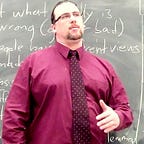Classic Metal Class Session 10 — Heavy Metal In Germany in the 1970s to Mid-1980s
it was time to tackle the rise of teutonic heavy metal!
We devoted a number of earlier sessions of classic metal class to the heavy metal scenes developing in the UK and USA during the 1970s and early 1980s. So for session 10, we decided it was time to branch out and start looking at some other areas. Eventually, down the line, we will look at the development of heavy metal in Japan, Canada, the rest of Europe, and other places, but for this one we chose to focus on the German heavy meal scene.
The two bands that probably first come to mind for most metalheads when you bring up German heavy metal in the 1970s and early 1980s are the Scorpions and Accept. Both of them had a major impact and influence worldwide by that era, evidenced by their many tours as well as by how many metalhead’s record and tape collections included their albums. The rich heavy metal scene based in Germany comprised many other bands, and so we wanted to extend our discussion to them as well.
If you’d like to watch or listen to the show episode, here it is:
As is typically the case with bands, before putting out their first LP album, the musicians would have to get together and coalesce into a unit, then develop their early catalogue, practicing and touring together, building a fan base. The Scorpions definitely had a jump on everyone else. The 1972 album Lonesome Crow, recorded by the first version of the band, featuring the young Michael Schenker — who would soon be snatched up by UFO — isn’t quite metal. Nor arguably is the majority of the 1974 Fly To The Rainbow produced by the reformed second version of the band. From 1975’s In Trance onward, though, the Scorpions are definitely cranking out heavy metal, releasing album after album up to their 1984 Love At First Sting.
Several other bands that develop along heavy metal lines also form, tour, and (sometimes) record in the 1970s. Accept forms in 1976, initially as “band X”, bringing together a core of Wolf Hoffmann, Peter Baltes and Udo Dirkschneider, releasing their first self-titled album in 1979, and then following up with new albums almost yearly until 1986’s Russian Roulette. Running Wild, better known later on for their “pirate metal,” start out in 1976, but won’t record any LPs until the 1980s. The case is similar with another band that is credited along with Accept and the Scorpions as being early pioneers of German heavy metal, Trance, who form under the name Tribut in 1974, but only release LPs in the 1980s. There’s also Cacumen who change their name later to Bonfire, who form in 1972, manage to bring out a single in 1979, and then LPs in the early 1980s.
Gravestone start out as a progressive rock band in 1977, but slide into metal, releasing their first album, Doomsday, in 1979. After departing from the Scorpions, Uli Von Roth forms a new band, Electric Sun, who bring out their first album Earthquake in 1979. Given the varied nationalities of its members, I doubt we can classify Michael Schenker Group — which he forms in 1979, releasing a self-titled debut in 1980s — as “German,” but it’s still worth mentioning.
In the 1980s the heavy metal scene in Germany — cross-fertilized by bands hailing from other parts of Europe, as well as the UK, USA, and Canada — grows exponentially. The early 80s see the formation of bands like Gravedigger, Living Death, Steeler, Stormwitch, Warrant, who will bring out solid albums by the mid-1980s. Sinner forms in 1982, including Herman Frank, soon to join Accept, and Mat Sinner who will later join Primal Fear. and then of course, there is Warlock, which will start out as a German band fronted by Doro Pesch, but end up (before being reformed as Doro) with mostly American musicians. The mid-1980s add a number of other important bands to the roster, including Helloween, Rage, Victory, and Lucifer’s Heritage (later Blind Guardian), all of which form in 1984.
One might point out that we’ve skipped over several important — and earlier — German thrash bands. Holy Moses forms in 1980, Sodom in 1981, and then Kreator, Tankard, and Destruction in 1982, so this is a pretty fertile period. We mentioned them in the session, but didn’t get into those bands as much, since we intend to do a show specifically focused on the development of thrash metal as a genre later on.
I’m Greg Sadler, the Heavy Metal Philosopher. You can join me and my co-host Scott Tarulli each month for a new session of Classic Metal Class).
I’m also the president of ReasonIO, a speaker, writer, and a producer of highly popular YouTube videos on classic and contemporary philosophy. I teach at Milwaukee Institute of Art and Design, and offer classes to the wider public in my Study With Sadler online academy. I also produce the Sadler’s Lectures podcast and co-host the Wisdom for Life radio show
